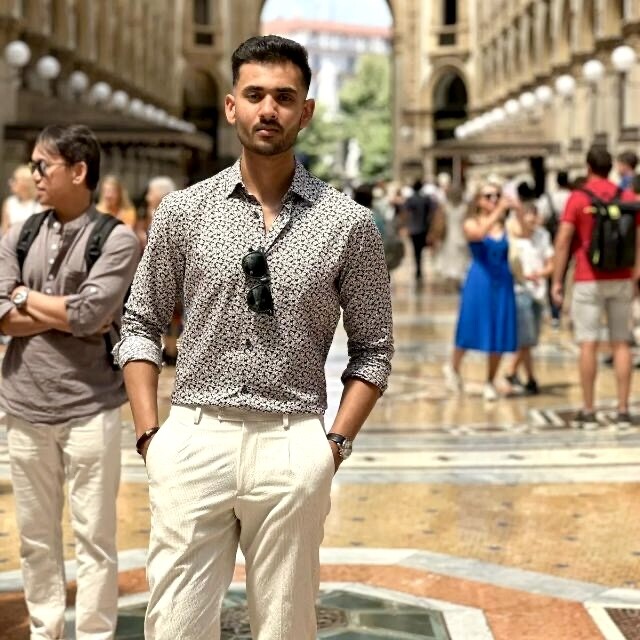How Cypriot Student Secured a DAAD Scholarship for Neurosciences at Universität Bonn
University: Rheinische Friedrich-Wilhelms-Universität Bonn
Degree: MSc in Neurosciences
Previous Education: BSc in Molecular Biology & Genetics, Eastern Mediterranean University, Cyprus (CGPA: 3.85/4.00)
Scholarship: DAAD Study Scholarship for Master’s Degree (2023–2025) – Full Funding
Standardized Exams: GRE (158 Quantitative, 147 Verbal, 4.0 AWA), IELTS 7.5, TOEFL 99/120

The Journey
My name is Muhammad Saifullah, and I am from Cyprus. Since my early academic years, I have been fascinated by the intricate workings of the human brain and the pathological processes underlying diseases such as Alzheimer's and glioblastomas.
Currently, I am pursuing an MSc. Neurosciences degree at Rheinische Friedrich-Wilhelms-Universität Bonn, Germany, with support from the prestigious German Academic Exchange Service (DAAD) scholarship. Through this program, I am actively gaining hands-on laboratory training and research experience, particularly focusing on the interactions between microglia and neurons in neurodegenerative diseases.
My passion lies in deepening our understanding of disorders like Alzheimer's and tumors of the brain, aiming to contribute to both their pathological study and therapeutic advancements.
DAAD Scholarship Details
I was honored to receive the Study Scholarship for a Master’s Degree in Neurosciences from the DAAD (Deutscher Akademischer Austauschdienst) for the period 2023–2025. This scholarship fully supports my living expenses and academic training at Universität Bonn.
I chose DAAD among several explored options because of its distinguished reputation, wide alumni network, and its mission to promote international academic exchange and excellence.
Educational Background
Prior to my master’s studies, I completed a BSc in Molecular Biology & Genetics at Eastern Mediterranean University, Cyprus (CGPA: 3.85/4.00, ECTS: 240/240).
I was awarded the "Merit Scholarship for Top Student of the Faculty of Arts and Sciences" for maintaining the highest GPA for three consecutive years.
Additionally, my bachelor’s thesis, focusing on the adaptive evolution of TTX resistance across species through SCN4A gene studies, strengthened my skills in molecular biology and neuroscience. This rigorous training, combined with internships in genetics and molecular diagnostics, prepared me well for advanced research in the neurosciences.
How Did You Prepare to Apply to Institutions?
I carefully researched universities in Germany offering strong neuroscience programs with an emphasis on translational research. I contacted program coordinators, reviewed faculty research interests, and tailored each application meticulously.
Ensuring a strong alignment between my research interests and the lab groups at Bonn was crucial. I also prioritized programs offering opportunities for collaborative projects, such as those available through DZNE (German Center for Neurodegenerative Diseases).
Standardized Tests and Preparation
To meet admission and scholarship requirements, I took the GRE (Quantitative Reasoning: 158/170, Verbal Reasoning: 147/170, AWA: 4.0/6) and English proficiency exams, scoring IELTS: 7.5 overall and TOEFL: 99/120.
I prepared by following structured study plans, focusing particularly on verbal sections for the GRE and speaking modules for IELTS. Regular practice tests and time management techniques were key to my preparation.
How Did You Prepare to Apply to the DAAD Scholarship?:
For DAAD, I invested significant time in drafting a strong motivational letter, emphasizing my academic achievements, prior research internships, and how my future goals align with the DAAD mission.
I requested recommendation letters from professors familiar with my research capabilities and academic dedication who were already in Germany.
Additionally, I participated in workshops on scholarship writing and sought feedback on my documents from mentors and peers. I also gave strong emphasis on my participation in extracurricular activities.
What Do You Think Made Your Application Stand Out?
A clear focus on neuroscience research with already accumulated hands-on experience in fluorescence immunohistochemistry, confocal microscopy, RNA-sequencing analysis, and multiple international research internships helped my application stand out.
Publishing a first-author paper in an SCI-indexed journal also demonstrated my commitment to academic excellence early in my career.
What Would You Have Done Differently?:
I would have started networking and seeking research supervisors in Germany earlier. Pre-establishing connections might have provided even stronger research collaborations or pre-acceptance letters that could bolster the scholarship application.
Advice for Future Applicants:
- Start Early: Give yourself enough time to polish your applications and gather strong references.
- Highlight Impact: Instead of listing activities, emphasize the impact of your research and studies.
- Tailor Everything: Customize each letter and form for the specific scholarship and university you are applying to.
- Stay Persistent: Rejections are part of the journey. Learn from each application cycle to improve.
Want to submit your
scholarship journey?
Submit Your Story Here!
More Scholarship Recipients

My name is Zara Qaiser. I’m originally from Singapore and Pakistan (yes, both!), and I am now pursuing a PhD in Public Pol .... Read more
- American University
- Columbian College of Arts & Sciences Doctoral Fellowship
- Economics
- Fully Funded Scholarships
- Graduate Assistantships
- Graduate Merit Award (American University)
- Pakistani Nationality
- Ph.D. Scholarships
- Public Administration
- Public Policy
- Singaporean Nationality
- The George Washington University
- United States
- University of Massachusetts Boston

Hello! My name is Sakshi Barhai, and I am from Pithora, a small town in the state of Chhattisgarh, India. After clearing the .... Read more

My academic journey toward biomedical science has been shaped by both curiosity and reality. Growing up in Pakistan, I obser .... Read more

Leave A Comment